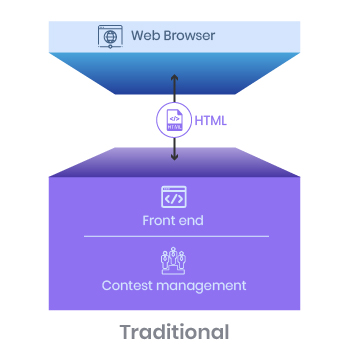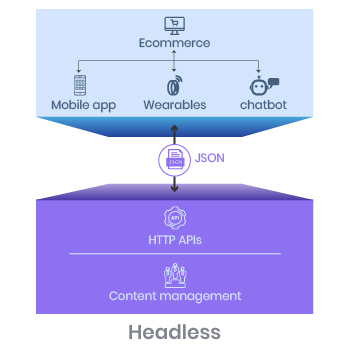


Renoj Raphael
7 Minutes read
Why Migrate to Drupal Experience Platform?
Content is the foundation of every experience in the modern business landscape. A Content Management system (CMS) with a Headless, Decouple or content as a service (CaaS) architecture plays a crucial role in providing every organization with a personalized digital experience platform, starting from the brand and customer to employee experience.
Organizations should invest time in evaluating and selecting the right system to meet the rising demands and expectations of customers amid the increasing number of channels in the future. CMS provides the structure and interface to enable seamless customer experience management on any number of digital touchpoints. However, in the new digital technologies landscape, the traditional CMS does not suffice. As CMS is evolving with the evolving digital world, organizations need to select the right CMS that could be transformed into a Customer enablement platform.
The commonly used buzzwords to describe the CMS types are traditional, headless, and hybrid. Let’s explore the different types of content management systems, in what ways they differ, and how to decide which type of CMS best suits your organization.
Traditional CMS
The traditional Content Management system is developed to create and publish HTML content directly to the web with a low-code approach. It manages the complete process starting from content authoring to publishing the content to the browser, which the end user sees. In such type of CMS, both the front and the back-ends are tied together.

Headless or decoupled CMS
Headless, decoupled or CaaS – all drives to the channel-agnostic method of content delivery. The front and back-end systems are decoupled, separated from each other with Drupal providing endless opportunities for delivering content digitally. As the content is not tied to a specific front-end framework, the content can be pushed to any customer experience touchpoints such as the mobile app, browsers, voice devices, eCommerce, Print, wearables, social media, IoT, chatbots, AR/VR, and Kiosk.

Security
Drupal is designed with an uncompromising security standard. The security features are built with a granular access control and database encryption.
Performance & Scaling
Drupal supports rapid content growth, content caching, and server scaling capabilities. Drupal’s scalability delivers consistency across platforms with the increase in number of mobile users by rendering and catering to changing needs of the content quickly through better customer experience management. As per Google, if a site takes more than 3 seconds to load, the user abandons it, directly impacting the revenue.
Multilingual
Drupal has the capability of supporting around 100 languages. The automated language translation allows Drupal to reach a global audience with localized content. From boosting search engine optimization to enabling higher conversion rates, multilingual sites play a crucial role in widening the audience reach. People prefer browsing the content in their native language and doing transactions.
Accessibility
Drupal adheres to all the Web Content Accessibility guidelines related to reaching 100% of your audience. It increases every audience’s reach by providing a platform that’s accessible to people with a range of digital disabilities. Drupal Experience Management platform enables organizations to achieve semantic code handling for screen readers and W3C standards.
Marketing Automation
In the digital world, integrations play a significant role for every organization to advance their marketing communication across diverse channels. Drupal’s integration features effortlessly connect to marketing automation tasks, such as email marketing, CRM, social media, analytics, optimization, and delivering the right content at the right time.
Content as a Service
Drupal helps organizations decouple the front-end and back-end to scale content across silos. Headless, Decouple or CaaS Drupal offers a preconfigured development environment with a full-scale digital content lifecycle management. Drupal allows creating reusable content, displaying in various layouts, providing better responsive experience and personalized content for targeting audience, and customizing views for content authors and editors. Now, with Drupal’s CaaS, front-end development is not tied up with the content management system anymore.
User Experience
Drupal offers a seamless customer experience management to help developers create intuitive user interfaces using a wide range of add-ons and feature-rich toolsets. The adaptability in such features allows developers and marketers to equally leverage and create a memorable customer experience.
Community
Drupal has a community of over 1.4 million users in 200+ countries. The organization contributes to innovation, development of new tools, while providing expert insights on the Drupal brand and platform. The community contributions have secured Drupal’s position as the world’s most used Digital experience platform, and the leading global consortiums are migrating towards Drupal.
The future of Drupal as a promising CMS platform for exceptional digital experiences
The extreme traffic burst with rich content sites like Grammy Awards and NBC Olympics, and the big enterprises’ need of multi-channel sites with custom content such as Pfizer and weather.com are powered by the Drupal Experience platform. The Decoupled or CaaS approach and the high security with the open community support in the Drupal platform makes the CIO and CMO organizations rethink the move from other traditional CMS to Drupal experience.
For more Info please check these links :
https://www.acldigital.com/offerings/digital-experience
https://www.acldigital.com/offerings/digital-experience/experience-portals/drupal-experience-portal




